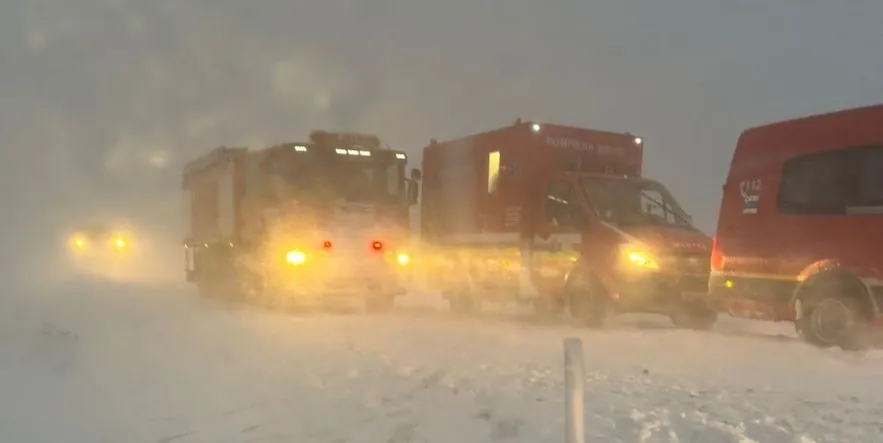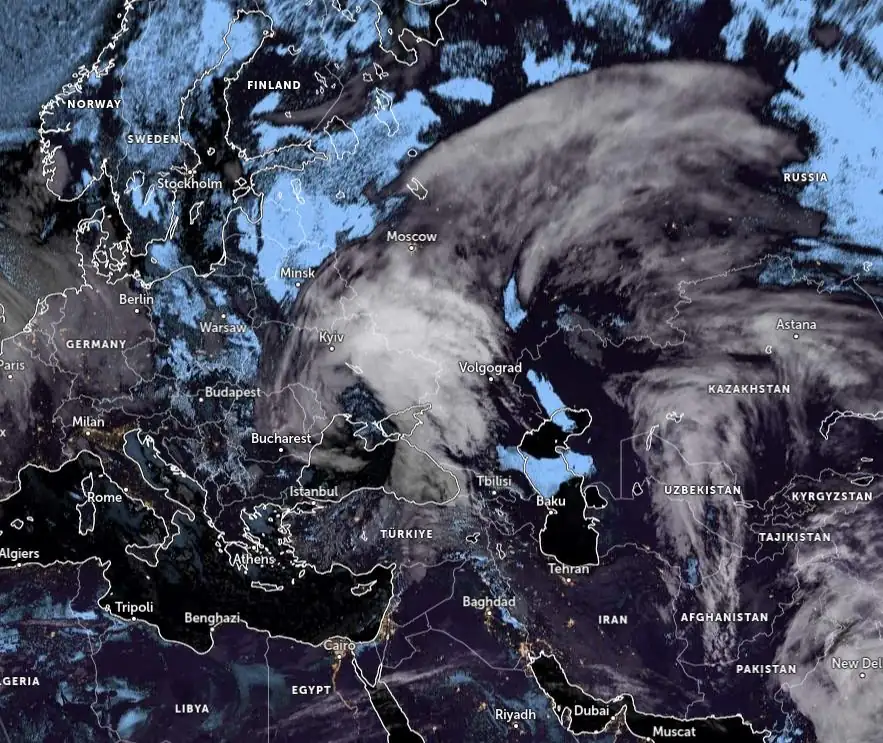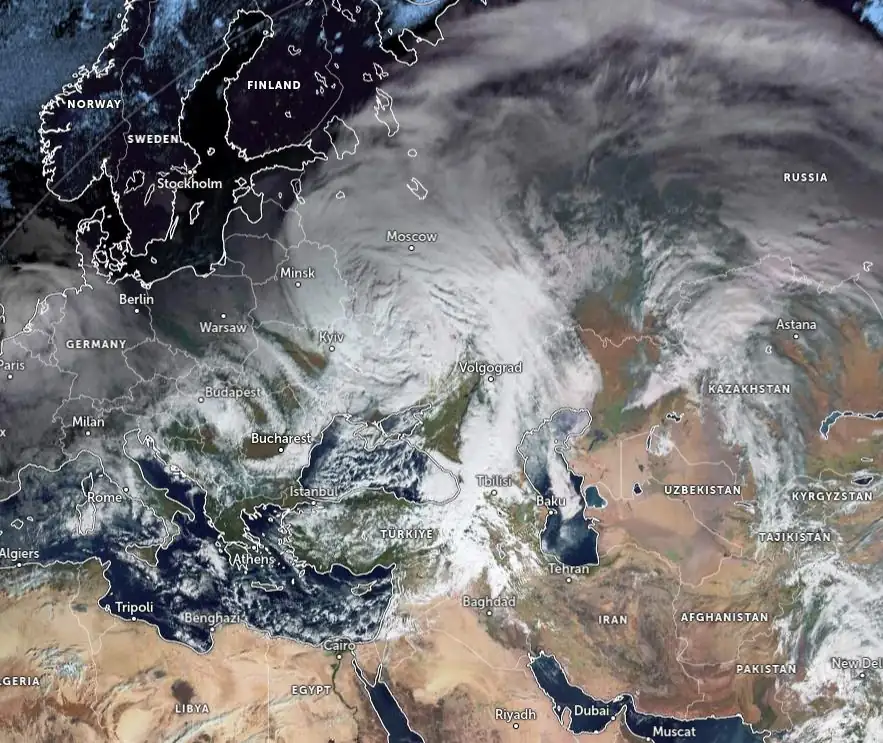Widespread damage and at least 23 fatalities, 12 missing in Eastern Europe after rapid intensification of Storm Bettina

Eastern Europe is still grappling with the aftermath of Storm Bettina, a severe snowstorm that rapidly intensified over the Black Sea and impacted the region on November 26 and 27, 2023. Ukraine has reported significant casualties, with at least five deaths and 19 injuries in the Odesa region. The storm has not only disrupted life in Ukraine but also inflicted damage and caused fatalities in neighboring countries such as Moldova, Romania, Bulgaria, Turkey, and Russia.
- The total number of fatalities across the affected regions due to Storm Bettina is 23, as of early November 29. This includes 10 in Ukraine, 4 in Moldova, 2 in Bulgaria, 2 in Turkey, 4 in Russia, and 1 confirmed dead from the cargo ship incident near Lesbos. The search for 12 missing sailors in Greece continues.
- Out of 14 crew members in a cargo ship that sunk near Lesbos, one was rescued by a Hellenic Navy helicopter, with a search operation ongoing for the remaining 13.
- This is the 12th named storm of the 2023/24 European windstorm season — the ninth season of the European windstorm naming. The season started on September 1 and will last through August 31, 2024.
The devastating impact of Storm Bettina has been felt across several Eastern European countries, particularly in the Black Sea region, leaving a trail of destruction, fatalities, and widespread disruptions.
In Ukraine, the southern Odesa region bore the brunt of the storm, with at least 10 deaths and 19 injuries. The storm, characterized by heavy snowfall and high winds, resulted in snow drifts reaching up to 2 meters (6 feet) in depth. The intensity of the storm led to significant traffic disruptions and extensive power outages across 17 regions, affecting over 1 500 settlements. The country’s Energy Ministry reported that the electrical grids suffered considerable damage due to the strong winds, leaving large parts of central Kyiv, as well as the southern regions of Odesa and Mykolaiv, without power. Initially, 40 000 homes in the Kyiv region were affected, with more than 15 000 still without electricity by the evening.
Moldova also faced severe consequences from the storm, with 10 people injured and 4 fatalities. Among the dead were individuals who succumbed to hypothermia – two found in a car in the east and another outside the capital. A tragic traffic accident, attributed to the treacherous conditions, claimed the life of a 40-year-old man.
In Bulgaria, the impact of the storm was marked by traffic accidents, resulting in at least 2 deaths and 36 injuries within a span of 24 hours. The Bulgarian authorities reported these incidents amidst the challenging weather conditions brought on by the storm.
In Turkey, Bettina claimed two lives in Izmir — a 62-year-old man in Konya after his car was swept away by flash flood and a 58-year-old man who died when a wall collapsed on him while working on a construction side in Sinop.
Russia’s Crimean Peninsula experienced hurricane-force winds, reaching up to 144 km/h (90 mph), accompanied by a significant tidal surge. This extreme weather led to the relocation of around 350 people to safer facilities, severe flooding that impacted major roads, and disruptions to the water supply in several communities.
On the same day, Moscow experienced what their meteorologists referred to as a ‘black blizzard,’ a term usually reserved for harsh weather patterns in Russia’s Far North, characterized by snowflakes flying close to the ground and significantly limiting visibility.
This unusual event began overnight and has brought heavy snowfall to the Russian capital, drastically reducing visibility to about 100 meters (328 feet) and creating dangerous conditions for both residents and commuters in Moscow.
The FOBOS weather center reported that the snowfall, which began on Sunday, has intensified rapidly. Within just a few hours, the city recorded 35% of its average monthly precipitation. Roman Vilfand, the head of Russia’s Hydrometeorological Center, emphasized the severity of the situation, noting that Moscow might be witnessing one of its heaviest November snowfalls in decades. The last time Moscow experienced such extreme weather was over four decades ago, as reported by Channel One, making this event particularly notable.
At least 4 deaths have been reported in Russia.
Additionally, a maritime tragedy unfolded off the coast of Lesbos, Greece, where a cargo ship sank amidst the stormy conditions. The Associated Press reported one confirmed fatality and 12 missing persons. The ship, traveling from Egypt to Istanbul, reportedly took on water, leading to the sinking. Greek coast guard officials highlighted the difficulties in rescue operations due to the rough sea conditions.
Impacts of the storm were felt as far west as southern Croatia, where significant drop in temperatures accompanied by snowfall on the morning of November 27 resulted in widespread traffic chaos.
Forecasters have issued warnings for more adverse weather, expecting snow and rain to continue across the region on Tuesday, November 28.


Detailed information can be found in the following reports:
Featured image credit: IGSU

Commenting rules and guidelines
We value the thoughts and opinions of our readers and welcome healthy discussions on our website. In order to maintain a respectful and positive community, we ask that all commenters follow these rules.